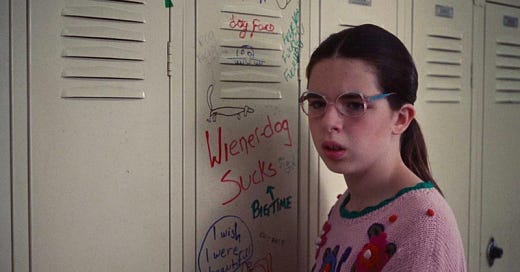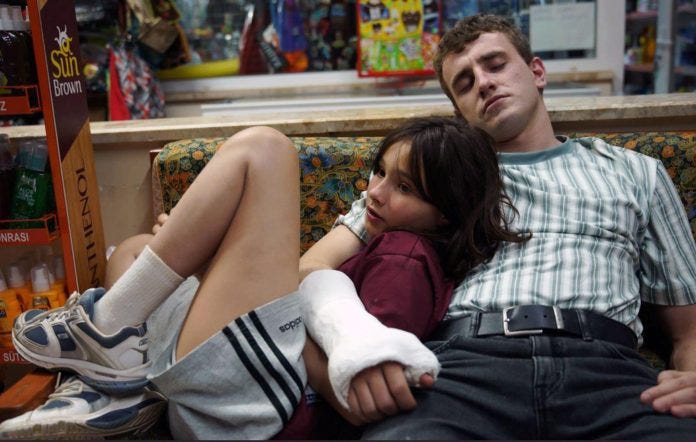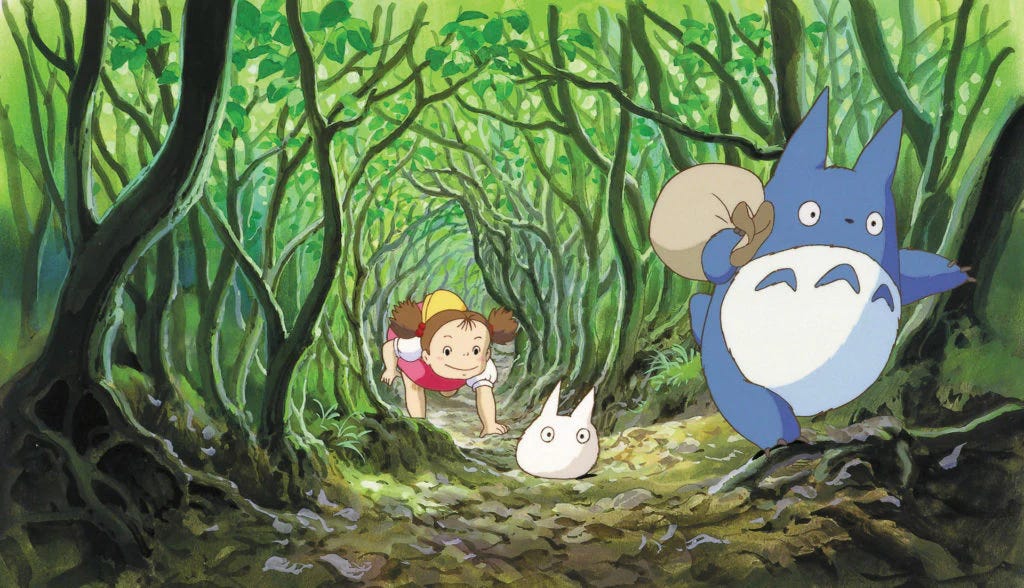JUNE 2025 PICKS: PRE-TEENS AND TWEENS
A selection of movies about the precarious and transient ages of ten to fourteen.
WELCOME TO THE DOLLHOUSE (1995)
Welcome to the Dollhouse’s Dawn Weiner (Heather Matarazzo) has a name that, unfortunately, suits her. Dawn is gawky and sullen; often picked on by her cohort, and not particularly kind to others, herself. Dawn hates her younger sister, gets in trouble at school, and has her romantic and sexual sights delusionally set on the bad boy of the local high school, Steve Rodgers (Eric Mabius). Her world is rape threats from other tweens and bright blue ponytail baubles, oversized, gaudy animal tees and a mother who flat-out dislikes her. No one has ever had a worse case of being twelve years old. Dollhouse is a grim comfort, but anyone who remembers even a glimpse of their tween years will likely take solace.
AFTERSUN (2022)
Eleven-year-old Sophie (Frankie Corio) is stepping into the transitory era of pre-pubescence, but Aftersun is devoid of the usual pre-teen social scenarios. She is not in school or summer camp, nor is she bickering with her mom. Instead, Sophie is on holiday with her father, Calum (Paul Mescal); a brief week-long summer trip is the only time she sees him each year. As Calum’s mental illness worsens throughout the vacation, Sophie’s bridging between childhood and adolescence hits peaks and valleys. She’s a child who loves her dad and playing in the pool, she’s close enough to adolescence that she wishes the older teens at her resort would find her cool, and she occasionally plays the role of parent to her struggling dad, picking up his clothes and tucking him in after an episode. Aftersun is a tender and acute reflection of the lessons of pre-adolescence; heart-breaking only because love pours out of Sophie.
MY NEIGHBOR TOTORO (1988)
Much of Hayao Miyazaki’s canon is a loving ode to childlike play, but My Neighbor Totoro stands out as having play as not just a theme, but its essential thesis. Totoro follows sisters Satsuki and Mei as they settle into their new home in the country, where most of their time is spent using their imaginations and exploring. At ten years old, Satsuki’s role as big sister is important to her, but the way she cares for her sister is not in a manner that is parentified or weighty. Satsuki simply loves to love her sister, and does so by playing with her enthusiastically. There’s big stuff on the horizon for Satsuki, surely — she’s in school, her mother is sick, adulthood will come for her. But Totoro is a film that worries only about Satsuki reveling in the dense imagination and emotion of childhood, something encouraged by everything around her — her parents, her sister, her new home, and the friendly, fuzzy creatures that live in the woods.
DÌDI (2024)
Sean Wang’s Dìdi is maybe the most matter-of-fact of these picks. Not candy-colored and sadomasochistic like Dollhouse, not as intense as Aftersun, and not as joyful as My Neighbor Totoro. Chris (Izaac Wang) is a thirteen-year-old living in small-town California in 2008 — the peak of Spike Jonze-esque skating videos, AIM, and the casually racist joke. Chris is superficially desperate to fit in, but has interior emotions and needs that tend to not quite match what Chris is always “supposed” to want — a dissonant experience that leaves him interpersonally flubbing in what feels like perpetuity. Unlike many other films of Dìdi’s ilk, there is no lightning-bolt epiphany or launch into maturity. Chris is still very much figuring it out; which is, perhaps, the most honest message one can offer a thirteen-year-old.







